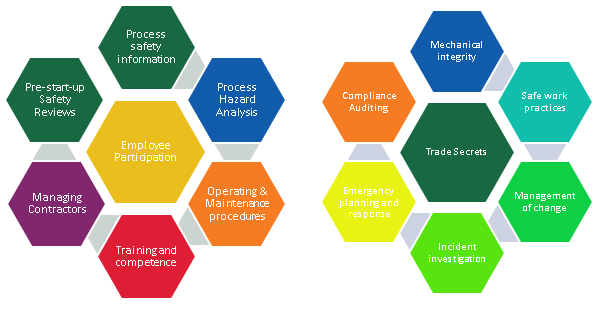Industrial accidents involving hazardous chemicals or processes can have devastating consequences, not only for employees but also for surrounding communities and the environment. This is why Process Safety Management (PSM) plays a critical role in ensuring safety in industries that handle high-risk operations. This guide explores the importance of PSM, its key elements, and how it helps prevent industrial accidents.
What is Process Safety Management?
Process Safety Management refers to a systematic framework designed to prevent accidents caused by the release of hazardous substances. It focuses on maintaining the integrity of operating systems, equipment, and processes. OSHA (Occupational Safety and Health Administration) created the PSM standard to address the management of highly hazardous chemicals and ensure workplace safety. Implementing PSM means establishing protocols that reduce risks associated with toxic, reactive, or flammable chemicals during industrial operations.
You can learn more about Process Safety Management through expert audits and compliance services.
Key Elements of Process Safety Management
- Process Hazard Analysis (PHA): One of the most crucial steps in PSM is conducting a PHA. This involves a thorough assessment of potential hazards within an industrial process and identifying failure points that could result in accidents. Tools like Hazard and Operability Study (HAZOP) and Failure Mode and Effects Analysis (FMEA) are commonly used.
- Operating Procedures: Clearly documented procedures must be in place to ensure workers understand the steps required to safely operate machinery and handle chemicals. These procedures should be regularly updated based on changes in operations or after any incident.
- Employee Training: Workers should be thoroughly trained in the processes they manage, especially when working with hazardous materials. Continuous education on safety protocols and emergency responses helps reduce human error—a significant cause of industrial accidents.
- Mechanical Integrity: Regular maintenance of equipment is vital. Faulty machinery can lead to leaks, fires, or explosions. Ensuring mechanical integrity means inspecting, testing, and maintaining equipment to prevent breakdowns and dangerous incidents.
- Management of Change (MOC): Industrial processes often evolve, whether through technological advancements or changes in materials. PSM requires a formal MOC process to evaluate and approve these changes to ensure they do not introduce new risks.
- Emergency Response Planning: In the unfortunate event of an incident, having a solid emergency response plan is key. This includes coordination with local emergency services, setting evacuation procedures, and having necessary protective gear and firefighting equipment.
How PSM Prevents Industrial Accidents
PSM is designed to create a culture of safety, where risk management becomes a proactive rather than a reactive process. By focusing on both the technical and organizational aspects of safety, industries can reduce the likelihood of catastrophic events. Here’s how PSM contributes to preventing industrial accidents:
- Identifying Potential Failures Early: PHA and safety audits can uncover weak points in processes or equipment that could lead to accidents.
- Reducing Human Error: Training employees to recognize hazards and follow safety procedures reduces the chance of accidents resulting from mistakes.
- Maintaining Equipment: Regular inspections and mechanical integrity programs prevent malfunctions that could otherwise lead to explosions or chemical leaks.
- Structured Emergency Plans: A detailed emergency response system can mitigate the impact of an accident, limiting harm to employees and the environment.
Long-Term Benefits of Implementing PSM
- Enhanced Safety Culture: When safety management is ingrained into everyday operations, it fosters a culture of awareness and responsibility among employees.
- Regulatory Compliance: Industries handling hazardous chemicals must adhere to OSHA regulations, and implementing PSM ensures compliance with these requirements, avoiding legal penalties.
- Reduced Financial Losses: Industrial accidents can lead to significant financial loss, from property damage to insurance claims. By reducing the likelihood of accidents, PSM helps minimize financial risks.
- Improved Reputation: Companies that prioritize safety gain trust from employees, stakeholders, and the public. Preventing accidents not only safeguards lives but also enhances the company’s reputation in the industry.
Common Challenges in PSM Implementation
- Resistance to Change: Employees may resist new protocols if they are not effectively communicated or if they feel it will hinder productivity.
- Cost: Initial costs for upgrading equipment, conducting safety audits, or providing employee training can be high, but these investments pay off in the long run by preventing costly accidents.
- Continuous Monitoring: Effective PSM requires continuous evaluation and updating of safety protocols. Maintaining vigilance can be challenging but is necessary for ensuring long-term safety.
Conclusion
Process Safety Management is essential in industries where hazardous chemicals and processes are part of daily operations. Implementing PSM not only protects employees and the environment but also ensures regulatory compliance and long-term financial stability. By focusing on proactive safety measures—like hazard analysis, training, mechanical integrity, and emergency planning—industries can prevent industrial accidents and promote a culture of safety.
For more information on how to implement effective PSM strategies, visit The Safety Master to learn about expert safety audits and compliance services.



